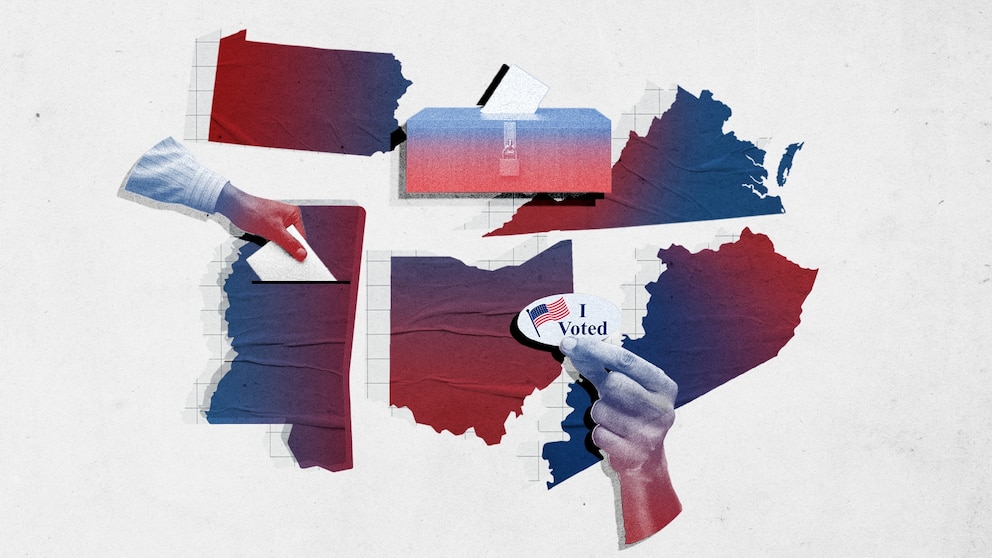
Happy Election Day, America. On Tuesday, voters in at least 37 states are heading to the polls to vote in the biggest election day until the hotly anticipated 2024 presidential election. But Tuesday is much more than just a dress rehearsal for next year’s big kahuna. Control of state government is up for grabs in states that are home to a total of over 25 million people, and voters will weigh in directly on hot-button issues like abortion access through numerous ballot measures. It would be impossible to run down every election on Tuesday’s ballots, but here’s the skinny on some of the most important races to watch.
Kentucky
Races to watch: Governor
Polls close: 6 p.m. Eastern in the eastern half of the state, 7 p.m. Eastern in the western half
Kentucky is a deep red state that voted for former President Donald Trump by nearly 26 points in 2020, but Democratic Gov. Andy Beshear, who won election in 2019 by less than 1 percentage point, is one of the most popular governors in the entire nation. Can he continue to defy the state’s politics to follow in his father’s footsteps and win a second term?
Even 49 percent of Republicans approve of Beshear’s job performance, which has helped him maintain a lead in polling for much of the race. Beshear, first elected in 2019, has a commanding lead in fundraising, too, with $16.5 million raised as of mid-October compared to his opponent, Kentucky Attorney General Daniel Cameron, who had raised $3.4 million.
But President Joe Biden’s generally dismal approval ratings and Kentucky’s fundamental Republican lean may be working against him. Cameron, who won an early endorsement from Trump, has gained ground in recent polling. The first Black Kentuckian to hold his post, Cameron is a rising star in the Republican Party.
So while Beshear remains a slight favorite, Cameron’s strong challenge could make this race close.
Virginia
Races to watch: State Senate, state House
Polls close: 7 p.m. Eastern
Although other races will get plenty of attention, Virginia may have the most important elections on the docket Tuesday. Since the 2021 election, the state has had divided government, with Republican Gov. Glenn Youngkin and the GOP-controlled House of Delegates facing off against the Democratic-held state Senate. But Tuesday, all 100 House seats and all 40 Senate seats are on the ballot, which presents the GOP with an opportunity to capture a “trifecta” — control of the governorship and the entire General Assembly. This would have major ramifications in what has recently been a bluish-purple state. Most notably, Youngkin has previously pushed for a 15-week abortion ban, and with the GOP in control, the party could reverse Virginia’s status as the only state left in the South that has a less restrictive abortion law.
Limited polling of the Virginia electoral environment suggests we’re in for a close race. A handful of polls in late September through late October asked likely voters if they planned to vote for a Democrat or Republican in the upcoming election and found party preferences pretty evenly split.
Surveys have also shown that Biden might be a hindrance for Democrats, while Youngkin could help Republicans. That’s because Biden’s approval rating in Virginia is in the low 40s, while Youngkin’s standing is in the mid-50s. Yet Democrats hope that abortion, and fear of full GOP control, might mitigate damage from Biden’s poor standing. Polls have found Virginia voters view abortion as one of the most important issues to their vote this year. Still, Republicans aim to ride other issues to majority control, particularly education, which polls also show is top of mind for voters.
Control of each chamber will likely come down to a small number of seats, and races are taking place on maps that look much different after the latest round of redistricting. The most competitive seats all lie in suburban or exurban areas of the state’s three major metropolitan areas of Northern Virginia, Richmond and Hampton Roads. In the Senate, Democrats may have a slight edge, as they appear favored in 19 seats to the GOP’s 16. That means Republicans would need to win four of the remaining five highly competitive seats to get to a 20-20 tie (which would hand them control via Republican Lt. Gov. Winsome Sears’s tiebreaking vote). The House map looks closer to a pure toss-up, with fewer than 10 seats likely to decide things.
Ohio
Races to watch: Issue 1, Issue 2
Polls close: 7:30 p.m. Eastern
While campaigns across the country highlighted abortion access in their messaging, abortion access itself is on the ballot in one state: Ohio. Buckeye State voters will have the option to vote “yes” or “no” on Issue 1, which, according to the language of the proposed amendment, would enshrine in the state constitution the “right to make and carry out one’s reproductive decisions, including but not limited to decisions on contraception, fertility treatment, continuing one’s own pregnancy, miscarriage care, and abortion.”
Polling suggests that Ohio voters largely support abortion rights and the provisions of Issue 1 — for example, Baldwin Wallace University conducted a poll Oct. 9-11 that found 58 percent of Ohio voters would vote yes on the proposed amendment, 34 percent would vote no and 8 percent were undecided. But the circumstances around the ballot measure may complicate things. The state ballot board, led by the Republican secretary of state, had final say on the wording that will appear on the ballot, and replaced terms like “fetus” with “unborn child.” Ohio Northern University conducted a poll Oct. 16-19 testing how voters responded to the proposed amendment when given two versions of it: one using the “unborn child” wording that will appear on the ballot and the other using the official language of the amendment. The version that included the language as it will appear on the ballot garnered 52 percent support, while the version that used the language of the amendment itself garnered 68 percent.
There’s also an Issue 2 worth watching, which would legalize the use of recreational marijuana. The proposed statute would allow Ohioans to possess and grow marijuana, albeit with limitations, and create a new Division of Cannabis Control within the Department of Commerce to regulate it. The Ohio Northern University poll found that two-thirds of voters agree that marijuana should be legal for medical and recreational use.
Mississippi
Races to watch: Governor
Polls close: 8 p.m. Eastern
While Democrats may have a slight edge in Kentucky’s gubernatorial race, the reverse is true in Mississippi, where incumbent Republican Gov. Tate Reeves faces Democratic Public Service Commissioner Brandon Presley, one of just two Democrats in the state’s executive branch.
On paper, Mississippi’s solid red lean means this race probably shouldn’t be close, but Reeves hasn’t exactly had a sterling first term in office. In Morning Consult’s approval polling for the third quarter of 2023, Reeves ranked as the second least-popular governor in the nation. He’s also faced questions about a far-reaching scandal involving the misuse of federal welfare funds. Although Reeves hasn’t been directly implicated, he is closely linked to some of those who have, including former GOP Gov. Phil Bryant (whom Reeves served under as lieutenant governor). Presley, meanwhile, has a record of winning on red turf, thanks in part to his profile as a moderate-conservative Democrat — for instance, he describes himself as “pro-life.”
There is not much polling to go on, but Reeves probably has the upper hand heading into Tuesday. A late October Public Policy Polling survey on behalf of the Democratic Governors Association gave Reeves only a tiny edge, but that may be the rosiest picture one can paint for Presley. Released in early October, the next most recent poll from the Mason-Dixon/Magnolia Tribune put Reeves up 8 points. Still, Presley has outraised Reeves over the past year, and the two campaigns have run about even in overall spending. Reeves has sought to fire up the GOP base by highlighting his opposition to transgender women playing women’s sports and attacking Presley as part of a broader liberal agenda to change Mississippi. For his part, Presley has talked up his blue-collar background and values while trying to ding Reeves by connecting the governor to the welfare scandal.
Pennsylvania
Races to watch: State Supreme Court
Polls close: 8 p.m. Eastern
The biggest race on the ballot for Pennsylvania voters Tuesday is an expensive state Supreme Court contest between Republican Carolyn Carluccio, president judge of the Montgomery County Court of Common Pleas, and Democrat Daniel McCaffery, a Superior Court judge. The outcome of this race won’t change party control of the seven-member court (one of a handful in the country where judges are elected in partisan contests), but Democrats are hoping to win the vacant seat and pad their current 4-2 majority.
There isn’t much polling on this race — the only survey we found showed McCaffery in the lead 42 percent to 36 percent, with plenty of voters undecided. So the race could come down to each party’s messaging in this battleground state. Democratic groups have made abortion central to their turnout efforts and attacks against Carluccio. While Pennsylvania is unlikely to restrict abortion rights anytime soon, the court may weigh in on cases that determine the scope of abortion access, and its partisan makeup could influence which cases make it before the court in the first place.
On the conservative side, the lion’s share of spending can be traced to billionaire libertarian megadonor Jeff Yass, who’s poured over $4 million into the race. Attacks against McCaffery have largely centered on painting him as a Democratic Party lackey and tying him to the porn email scandal that forced his brother, former state Supreme Court Justice Seamus McCaffery, to resign in 2014.
The outcome of this race could have critical implications for voting access in Pennsylvania, as the court weighs in on continued legal battles over Act 77, a bipartisan state law that widely expanded access to mail-in voting in 2019. Carluccio suggested during the primary campaign that she would welcome challenges to the mail-in voting law, saying, “Act 77 has been very bad for our commonwealth. It has been very bad for just faith in our system.”
Other states
Because we’re election addicts, we can’t let you go without at least name-checking a few final states and races to watch.
First, all 40 seats in the New Jersey state Senate and all 80 seats in the New Jersey state Assembly are up for grabs on Tuesday. Normally, these chambers wouldn’t be worth watching, but some Republicans actually think they have a shot to flip them this year thanks to Democrats’ perceived weakness on issues like parents’ rights and offshore wind turbines. Due to redistricting, there are also an unusual number of open seats: nine in the Senate and 22 in the Assembly. That said, Democrats remain favored just because of how blue New Jersey is. Republicans would need to win six Democratic-held seats to flip the Senate and seven to flip the Assembly, including several seats that Biden would have carried by double digits in the 2020 election.
There are also eight congressional or state-legislative special elections on the ballot — most prominently in Rhode Island’s 1st Congressional District. Democrat Gabe Amo and Republican Gerry Leonard Jr. are facing off for the right to succeed former Rep. David Cicilline, who resigned at the end of May. The district is solidly Democratic, so Amo is extremely likely to become the first person of color to represent Rhode Island in Congress. Still, the final margin in this race, and Tuesday’s seven state-legislative special elections, will be worth watching as an indicator of the national political environment. If either Democrats or Republicans punch above their weight (i.e., the usual partisanship of the districts) in those special elections, it could be a good omen for them in the 2024 election.
Finally, don’t sleep on municipal races, like for mayor or county executive. The top jobs in Manchester, New Hampshire; Suffolk County, New York; Allegheny County, Pennsylvania; and Spokane, Washington, could all flip parties. Wichita, Kansas, could even elect a Libertarian mayor! School boards have also emerged as major battlegrounds this year, as conservative grassroots groups like Moms for Liberty try to put parental-rights supporters in charge of education in places like Iowa, Pennsylvania and Virginia.
Perhaps the biggest municipal prize is the open mayoralty in Houston, where state Sen. John Whitmire and U.S. Rep. Sheila Jackson Lee lead an 18-person field. Both are Democrats, but while Jackson Lee has the backing of liberals like former Speaker Nancy Pelosi and former Secretary of State Hillary Clinton, Whitmire is more moderate, which could help him consolidate support from Republicans in the likely runoff election on Dec. 9 (which will take place if no one gets a majority Tuesday).
We’ll be covering all of these races and more on our live blog of the results, which will go live at 5 p.m. Eastern on Tuesday. Join us back here then!
This post was originally published on this site be sure to check out more of their content.








